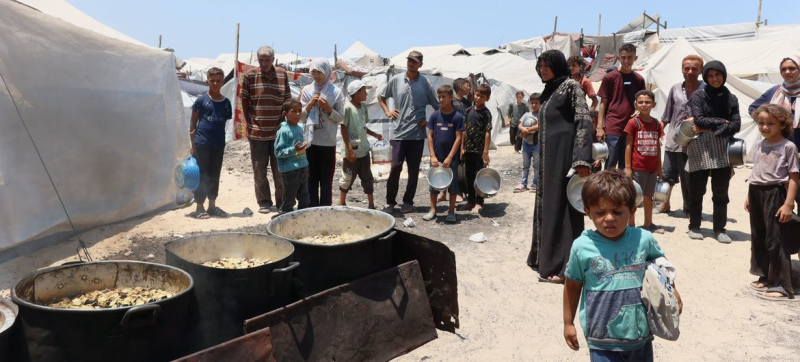- Israel Strikes Tehran with US Support Amid Nuclear Tensions |
- India Sees 9% Drop in Foreign Tourists as Bangladesh Visits Plunge |
- Dhaka Urges Restraint in Pakistan-Afghan War |
- Guterres Urges Action on Safe Migration Pact |
- OpenAI Raises $110B in Amazon-Led Funding |
Gaza Children Starve Amid Pauses, UN Warns of Catastrophe

Families seek food at a community kitchen in western Gaza City.
Despite daily “tactical pauses” declared by Israeli forces, humanitarian conditions in Gaza remain catastrophic, with children starving, aid workers overwhelmed, and fuel and water supplies critically low, UN humanitarians reported on Wednesday.
Speaking at the regular news briefing in New York, UN Deputy Spokesperson Farhan Haq said that even four days into the announced pauses, “we are still seeing casualties among those seeking aid and more deaths due to hunger and malnutrition.”
He added that parents are “struggling to save their starving children” and warned that the current conditions for aid delivery are “far from sufficient.”
The UN Office for the Coordination of Humanitarian Affairs (OCHA) said that while it is using every available window to deliver supplies during the unilateral pauses, the scale of need vastly outpaces what is getting through.
“A permanent ceasefire is needed more than ever,” Mr. Haq said, emphasising that “unilateral tactical pauses alone do not allow for the continuous flow of supplies required to meet the immense needs in Gaza.”
Access remains one of the biggest challenges.
Entry through the Kerem Shalom/Karem Abu Salem crossing requires multiple layers of approval from Israeli authorities, including safe passage, cessation of bombardment, and the literal unlocking of gates.
“Yesterday, three facilitated missions allowed our staff to collect cargo containing food from the Kerem Shalom and Zikim crossings and allowed for fuel to be transferred within Gaza,” Mr. Haq said.
“However, others faced impediments, particularly delays in receiving the green light to move from Israeli authorities, and one had to be cancelled.”
The situation was echoed by Ricardo Pires, UNICEF’s Communication Manager, who returned from Gaza this week.
“It’s absolutely apocalyptic,” he told UN News. “Children are being injured and killed while trying to get food and aid, all while suffering from malnutrition and hunger.”
Mr. Pires said that two out of the three criteria for a famine declaration have been met, according to the latest alert by food security experts.
UNICEF and other agencies are also grappling with the collapse of basic infrastructure.
“We’re on the brink of a man-made drought,” Mr. Pires said, with only 40 per cent of water production functioning and children turning to contaminated sources, risking deadly diseases.
“Children are dehydrated. They are reverting to contaminated water, which will make them sick with deadly diseases, diarrhoea outbreaks, and in some cases, even meningitis,” he added.
“It is a complete perfect storm of suffering for children.”Despite daily “tactical pauses” declared by Israeli forces, humanitarian conditions in Gaza remain catastrophic, with children starving, aid workers overwhelmed, and fuel and water supplies critically low, UN humanitarians reported on Wednesday.
Speaking at the regular news briefing in New York, UN Deputy Spokesperson Farhan Haq said that even four days into the announced pauses, “we are still seeing casualties among those seeking aid and more deaths due to hunger and malnutrition.”
He added that parents are “struggling to save their starving children” and warned that the current conditions for aid delivery are “far from sufficient.”
The UN Office for the Coordination of Humanitarian Affairs (OCHA) said that while it is using every available window to deliver supplies during the unilateral pauses, the scale of need vastly outpaces what is getting through.
“A permanent ceasefire is needed more than ever,” Mr. Haq said, emphasising that “unilateral tactical pauses alone do not allow for the continuous flow of supplies required to meet the immense needs in Gaza.”
Access remains one of the biggest challenges.
Entry through the Kerem Shalom/Karem Abu Salem crossing requires multiple layers of approval from Israeli authorities, including safe passage, cessation of bombardment, and the literal unlocking of gates.
“Yesterday, three facilitated missions allowed our staff to collect cargo containing food from the Kerem Shalom and Zikim crossings and allowed for fuel to be transferred within Gaza,” Mr. Haq said.
“However, others faced impediments, particularly delays in receiving the green light to move from Israeli authorities, and one had to be cancelled.”
The situation was echoed by Ricardo Pires, UNICEF’s Communication Manager, who returned from Gaza this week.
“It’s absolutely apocalyptic,” he told UN News. “Children are being injured and killed while trying to get food and aid, all while suffering from malnutrition and hunger.”
Mr. Pires said that two out of the three criteria for a famine declaration have been met, according to the latest alert by food security experts.
UNICEF and other agencies are also grappling with the collapse of basic infrastructure.
“We’re on the brink of a man-made drought,” Mr. Pires said, with only 40 per cent of water production functioning and children turning to contaminated sources, risking deadly diseases.
“Children are dehydrated. They are reverting to contaminated water, which will make them sick with deadly diseases, diarrhoea outbreaks, and in some cases, even meningitis,” he added.
“It is a complete perfect storm of suffering for children.”

